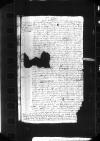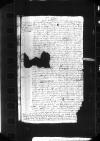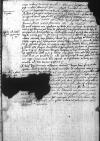List #3853
[Ioannes DANTISCUS] do Samuel MACIEJOWSKIBraunsberg (Braniewo), 1[545]-01-29
Regest polski:
Listy króla i adresata dotarły do Dantyszka po zakończonym sejmie [Prus Królewskich] w Elblągu poświęconym rozstrzyganiu spraw sądowych, gdy był jeszcze obecny biskup chełmiński [Tidemann Giese] razem z posłem rady miasta Torunia [Adrianem Friedewaltem]. Dantyszek przeczytał list króla [Zygmunta I] razem z nimi i z pewnymi osobami z rady miasta Elbląga [Nikolausem Friedwaldem, Jacobem Alexwangenem]. Kasztelana gdańskiego [Achatiusa von Zehmen (Achacego Czemy)] nie było już na miejscu, gdyż bez pożegnania dyskretnie wyjechał z podkomorzym malborskim [Johannem (Janem)] von Baisen (Bażyńskim)], kiedy w sprawach sądowych nie wszystko układało się po jego myśli. Biskup chełmiński dowiedział się z listu króla, że król pozwał radę miasta Gdańska, której posłowie [Barthel Brand, Johann Zierenberg] już wyjechali, przed sąd królewski. Zdaniem biskupa chełmińskiego należy przesłać kopie listu króla do członków rady Prus Królewskich z sugestią, aby prosili króla o odłożenie sprawy Pucka na wiosenny sejm [Prus Królewskich]. Według niego nie da się wystarczająco szybko wysłać posłów do króla w imieniu wszystkich członków rady [Prus Królewskich], którzy nie mogą przybyć, a nie ma też nikogo, kto bezpiecznie mógłby się podjąć takiej misji.
[Ustęp o opinii Dantyszka na temat pozwu królewskiego dla Gdańska w sprawie Pucka częściowo uszkodzony, niejasny] Dantyszek zaznacza, że członkowie rady Prus Królewskich powinni uważać, aby nie naruszyć swoich własnych przywilejów. Jak dalej potoczy się sprawa, skoro biskup chełmiński razem z gdańszczanami zjednał sobie większą część radców [Prus Królewskich], Dantyszek przekona się z ich stanowisk, które powinien otrzymać listownie.
O wspominanych kwestiach, a także o innych, Dantyszek ma nadzieję więcej opowiedzieć osobiście. Niezależnie od stanu swoich finansów, nadszarpniętych przez poprzednie wyjazdy, oraz od stanu zdrowia, który jednak ostatnio poprawił się dość wyraźnie, chce spotkać władcę i służyć mu radą.
Pozostałe wiadomości przekazuje na osobnej karcie. Prosi o dyskrecję.
W postscriptum Dantyszek informuje, że po odebraniu listu adresata poprosił kasztelana elbląskiego [Stanisława Kostkę], aby powrócił do niego do Elbląga, na co tamten przystał. Odbyli dyskusję o pozwie [dla gdańszczan w spawie Pucka]. Jakkolwiek w pozwie nie ma mowy o komendatorii, to jednak pozwani są zobowiązani do złożenia wyjaśnień nie tylko w sprawach wymienionych wprost, lecz także we wszystkich, które są przedmiotem pozwu. Klauzula będzie w takiej interpretacji bardzo pomocna.
Dantyszek potwierdza, że przybędzie na dwór, choć nie ma już pieniędzy, które mógłby oszczędzać. Nie zważa na niechęć i podejrzenia kierowane przeciwko sobie, gdyż – jak napisał mu Maciejowski – mogą się one rozwiać dzięki jego przyjazdowi. Uważa, że korzystne byłoby, gdyby razem z nim przybył także kasztelan elbląski. Prosi jednak, aby Maciejowski zaaranżował to w taki sposób, jakby został on wezwany przez króla w innych sprawach.
Jeśli nasi [członkowie rady Prus Królewskich] wyślą posłów, w co Dantyszek wątpi, albo postanowią cokolwiek w rozważanej sprawie, będą rozważać jego postawę. Nie da się opisać, jak bardzo biskup chełmiński [Tiedemann Giese] troszczy się o własne sprawy i jak bardzo szkodzi interesowi króla. Podobnie postępuje kasztelan gdański [Achatius von Zehmen (Achacy Cema)]. Mają swoje fakcje i nie zważają na swoje powinności wobec króla. Wyraźnie widać to w listach, w których mieli udzielić rady w sprawie postępowania przeciwko buntownikom [gdańskim]. Oskarżali króla i usprawiedliwiali swoich, jakby byli oni niesłusznie obwinieni. Formułowali nawet pewne groźby, że niestały lud może wystąpić przeciwko Królestwu [Polskiemu].
Dantyszek dziwi się ich pewności siebie. Jego zdaniem powinni pamiętać o swoich zobowiązaniach wobec króla, aby ten nie podjął przeciw nim stosownych kroków. [Tekst w akapicie częściowo uszkodzony]
Biskup chełmiński stwierdził, że listy królewskie zawierające skargę [na podstępowanie rady Prus Królewskich] dotyczącą listu polecającego [dla gdańszczan w sprawie starań o odzyskanie przez króla Pucka] wysłanego niedawno [z sejmu Prus Królewskich] w Grudziądzu, są nieistotne i nie zasługują, by na nie odpowiadać. Dantyszek natomiast powiedział, że skoro pozostali nie chcą odpowiadać, to on sam odpowie, aby dochować obowiązku wynikającego ze swej godności. Dodał, że radcy Prus Królewskich mają skłonność do wysyłania listów polecających, zwłaszcza takich, które nie mogą być dobrze przyjęte przez króla. Zasugeruje zatem, żeby odtąd były one odrzucane na dworze. Biskup chełmiński wziął to za żart, jako niebywały na dworze, nie mając świadomości, co tam się obecnie dzieje. Zdaniem Danyszka należy skierować do niego jakąś surowszą uszczypliwość, aby dokładnie poznał panujące na dworze stosunki. Dantyszek pisze to z sympatią dla niego, obawiając się, aby przez swobodę powstępowania kiedyś nie pozwolił sobie na zbyt wiele.
U sąsiada [Albrechta Hohenzollerna] przebywa jego bratanek [Albrecht Alcybiades], którego na piśmie tytułuje on księciem Prus. Podobno wyszło mu naprzeciw 1500 pieszych i jazda. Dotąd nie wiadomo dokładnie, w jakiej sprawie Albrecht naradza się z Albrechtem Alcybiadesem i ze szwagrem (bratem żony) [Adolfem, księciem Holsztynu]. Dantyszek postara się dowiedzieć więcej, doszło jednak do niego, że chodzi o jakieś małżeństwo i że rychło mają jechać na dwór. Jeśli ustali coś pewniejszego, przekaże to adresatowi przez posłańca, kiedy do niego powróci.
Prosi o przekazanie królowi treści jego listu, która wyda się istotna dla władcy, bez światków, zwłaszcza bez prymasa [Piotra Gamrata]. Dantyszek wie, że prymas jest mu nieprzychylny z powodu sprawy Pucka, w związku z którą cierpi wspólnie z adresatem. Zachęca, by nie poddawał się przeciwnościom. Wyraża nadzieję, że będzie mógł bezpieczniej omówić wszystkie sprawy podczas osobistego spotkania.
W drugim postscriptum Danyszek informuje, że otrzymał list od młodszego króla [Zygmunta Augusta] i królowej [Elżbiety Habsburżanki]. Król poinformował, że w ostatnich dniach odesłał do adresata niniejszego listu pismo Dantyszka. Władca, upomniany przez Dantyszka, aby nie dał się uwieźć w sprawie religii pisemkom przysyłanym z sąsiedztwa [Prus Książęcych], stwierdził, że pragnie pozostać przy dawnej pobożności i bronić jej w życiu prywatnym i publicznym. Dantyszek tak się tym ucieszył, że gotów był pojechać na Litwę z niewielkim pocztem, gdyby nie przeszkodził mu w tym ów sejm [Prus Królewskich], na którym rozpatrywano sprawy sądowe. Napisał już o tym do króla, ale ten odpisał, że jego przyjazd będzie dogodniejszy wiosną. Dantyszek dodaje te wiadomości już po zapieczętowaniu niniejszego listu. [Tekst drugiego postscriptum w kilku miejscach uszkodzony]
Rękopiśmienne podstawy źródłowe:
| ||||||
Tekst + aparat krytyczny + komentarz Zwykły tekst Tekst + komentarz Tekst + aparat krytyczny Ekscerpty dotyczące podróży Dantyszka
Reverendissime etc.
Accepi cf.
Tendebat [...] paper damaged⌈[...][...] paper damaged⌉ tota eius oratio, ut nuntii non mitterentur, sed ut [...] paper damaged⌈[...][...] paper damaged⌉or peteretur causam hanc in
De iis et aliis rebus fortassis superinscribed⌈fortassisfortassis superinscribed⌉ coram, Deo concedente superinscribed in place of crossed-out praestante⌈praestante concedente concedente superinscribed in place of crossed-out praestante⌉, fusius. Quandoquidem non superinscribed in place of crossed-out Non⌈NonQuandoquidem nonQuandoquidem non superinscribed in place of crossed-out Non⌉ est, quod
Reliquum dicet scheda atque hoc praescriptum, ut p[...] paper damaged⌈[...][...] paper damaged⌉ scheda, sub superinscribed in place of crossed-out pro⌈pro sub sub superinscribed in place of crossed-out pro⌉ mutua inter nos confisione habeat a Dominatione [...] paper damaged⌈[...][...] paper damaged⌉ Vestra Reverendissima maiorem in modum oro. Cui et commendatissimus esse cupio paper damaged⌈[cupio]cupio paper damaged⌉, et on the margin⌈etet on the margin⌉ omnia precor faustissima.
Ex
Postscript No. 1:
Reverendissime mi Domine.
Per  AAWO, AB, D. 7, f. 52r ad ea paper damaged⌈[ad ea]ad ea paper damaged⌉, quae in citatione exprimuntur, et ad omnia alia in termino obiicenda respon hidden by binding⌈[on]on hidden by binding⌉suri, quae clausula ad multa commodabit.
AAWO, AB, D. 7, f. 52r ad ea paper damaged⌈[ad ea]ad ea paper damaged⌉, quae in citatione exprimuntur, et ad omnia alia in termino obiicenda respon hidden by binding⌈[on]on hidden by binding⌉suri, quae clausula ad multa commodabit.
Ego quidem, ut ingenue fatear, ob hidden by binding⌈[b]b hidden by binding⌉
cf. Sen. Ep. 1.5 sera parsimonia in fundo est; Adagia 2.2.64 Sera in fundo parsimonia ⌊seram parsimoniam, quae iam in fundo estcf. Sen. Ep. 1.5 sera parsimonia in fundo est; Adagia 2.2.64 Sera in fundo parsimonia ⌋, velim non esse vocatus (suspi hidden by binding⌈[pi]pi hidden by binding⌉ciones et
odia contra me concepta nihil moror, quod adventu meo, sicut hidden by binding⌈[icut]icut hidden by binding⌉ cf.
Si nostri nuntios mittent, ut in litteris attigi (apud me adhuc in dubio hidden by binding⌈[io]io hidden by binding⌉ est), vel quicquid in eo statuerint, de me tractabitur on the margin, in the hand of Dantiscus⌈vel quicquid in eo statuerint, de me tractabiturvel quicquid in eo statuerint, de me tractabitur on the margin, in the hand of Dantiscus⌉. Ut itaque adventus meus et domini
Nequeo satis mirari [...] paper damaged⌈[...][...] paper damaged⌉ con paper damaged⌈[con]con paper damaged⌉fidentiam, ne dicam [...] paper damaged⌈[...][...] paper damaged⌉ [...] paper damaged⌈[...][...] paper damaged⌉tant se
Expostulatorias litteras de commendaticiis ex
Apud
Quam impense oro, ut ea, quae videbuntur ex iis, quae scripsi, non indigna scientiae hidden by binding⌈[iae]iae hidden by binding⌉ serenissimae
Cui me iterum atque written over ite⌈ite atque atque written over ite⌉ iterum amicissime et intime commendo etc.
Postscript No. 2:
A serenissimo
Cui me iterum diligentissime commendo etc.



